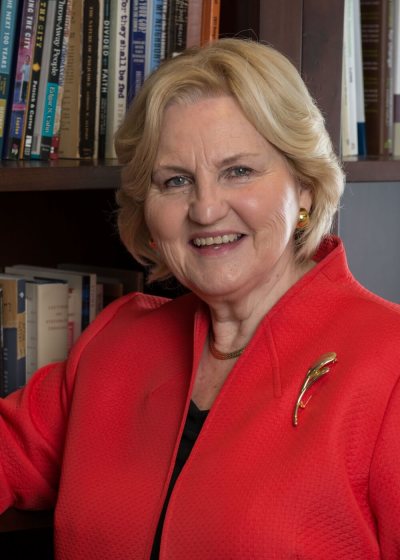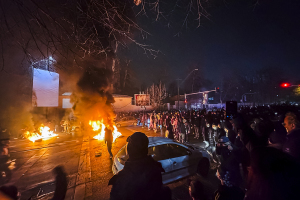Handling fear during crisis

The first emotional response to crisis — even a perceived crisis — is fear. Fear is stoked by loss: The loss of what we have known. The loss of the rhythms of life. The loss of immediate relationships. The loss of control of our destiny.
It feels as if our life is in the hands of an unknown person or group controlling our future. Fear increases with the number of deaths and the amount of unrest in the world.
Isolation and protectiveness become immediate effects of fear. In a state of isolation, a type of mild paranoia can set in, leading to lack of trust in others. Where are the people like me? I cannot trust those who are different from me. Fear also leads us to believe that the most extreme outcomes of any crisis will become reality. For example, when the stay-at-home orders for the COVID-19 pandemic were given, many families feared they would never see their loved ones again.
Many pastors also feel fear of the unknown. How do I reshape church services? How do I stay connected and pastor the people of my congregation? How do I do this in the next few days? Fear immediately exaggerates one’s inadequacies and brings secondary fears of comparison and public humiliation.
I was surprised by how the church responded at the beginning of the pandemic. There seemed to be a cry by many on social media to return to the old hymns and songs that once brought peace. Frankly, I even found them comforting and found myself sitting at the piano playing hymns I had not sung or played for years. This was not bad. After all, hymns can contain great theology to remind us of the unchanging character of God.
But I found the conversations then becoming divisive regarding what were accepted as songs worthy to be sung. This, again, led to isolation only with those “like me.” There were limited conversations of the needs around us, and rare mention of those of other ethnicities who were experiencing loneliness and death.
In other words, isolation clothed with fear makes it impossible to reach to others at the very time a compassionate heart would be healing to the fearful person as well as to the person in need.
When isolation is realized as one’s coping method, the next impact of fear is hopelessness: “Things will never be as have been known them, and I don’t know how to function in the new normal.” I believe most of us experienced this feeling at times throughout the pandemic. It is a natural response. But when one “parks” in isolation too long, hopelessness can then turn to anger.
Sadly, during the days of the pandemic crisis, I saw much of this anger turn to the church and to pastors. The reopening of churches and their changing schedules increased the number of angry emails to pastors and churches. In the same manner, the issue of wearing masks or not wearing masks escalated to the point of people changing churches, with angry outbursts to pastors and staff on their way out. These behaviors created pain and division within the church. I am concerned that we have not been teaching as Peter did: how to suffer, and how to lose yet gain (1 Peter 5:10).
Yet God our Creator knew we needed to know what to do with fear. The most often repeated commandment in the Bible — “Do not fear” or “Do not be afraid”— is found hundreds of times, which says something about the God who made us and knows us.
The first time God instructs someone to not be afraid is in Genesis 15:1, in these words spoken to Abram: “Do not be afraid, Abram. I am your shield, your very great reward.” It is interesting that this call to trust without fear follows three chapters of Abram’s obedience. Genesis 12 articulates the call of God to Abram: a bold call, requiring total obedience. However, in verses 11-13, the ugly head of fear rears its head. As a result, Abram feels he needs to lie to save his life:
"As he was about to enter Egypt, he said to his wife Sarai, “I know what a beautiful woman you are. When the Egyptians see you, they will say, ‘This is his wife.’ Then they will kill me but will let you live. Say you are my sister, so that I will be treated well for your sake and my life will be spared because of you" (Genesis 12:11-13).
It appears God recognized the fear and knew that Abram could not follow the next step of God’s call without acknowledging it. God does not judge Abram for his fear; he simply names it and reminds Abram, “Do not be afraid.” In the same way, we should name our fears during times of uncertainty. Doing so gives them less power and reminds us of God’s presence.
Adapted from “A Spirituality of Crisis Response” by Jo Anne Lyon, chapter 7 of When the Universe Cracks: Living as God’s People in Times of Crisis, edited by Angie Ward. Copyright ©2021. Used by permission of NavPress. All rights reserved. Represented by Tyndale House Publishers, a Division of Tyndale House Ministries.
Dr. Jo Anne Lyon serves as ambassador of the Wesleyan Church. She’s written several articles and publications, including the book The Ultimate Blessing, and has served as the General Superintendent Emerita for the Wesleyan Church. She has been adjunct professor of church and society at both Indiana Wesleyan University and Asbury Theological Seminary.the General Superintendent Emerita for the Wesleyan Church.



























